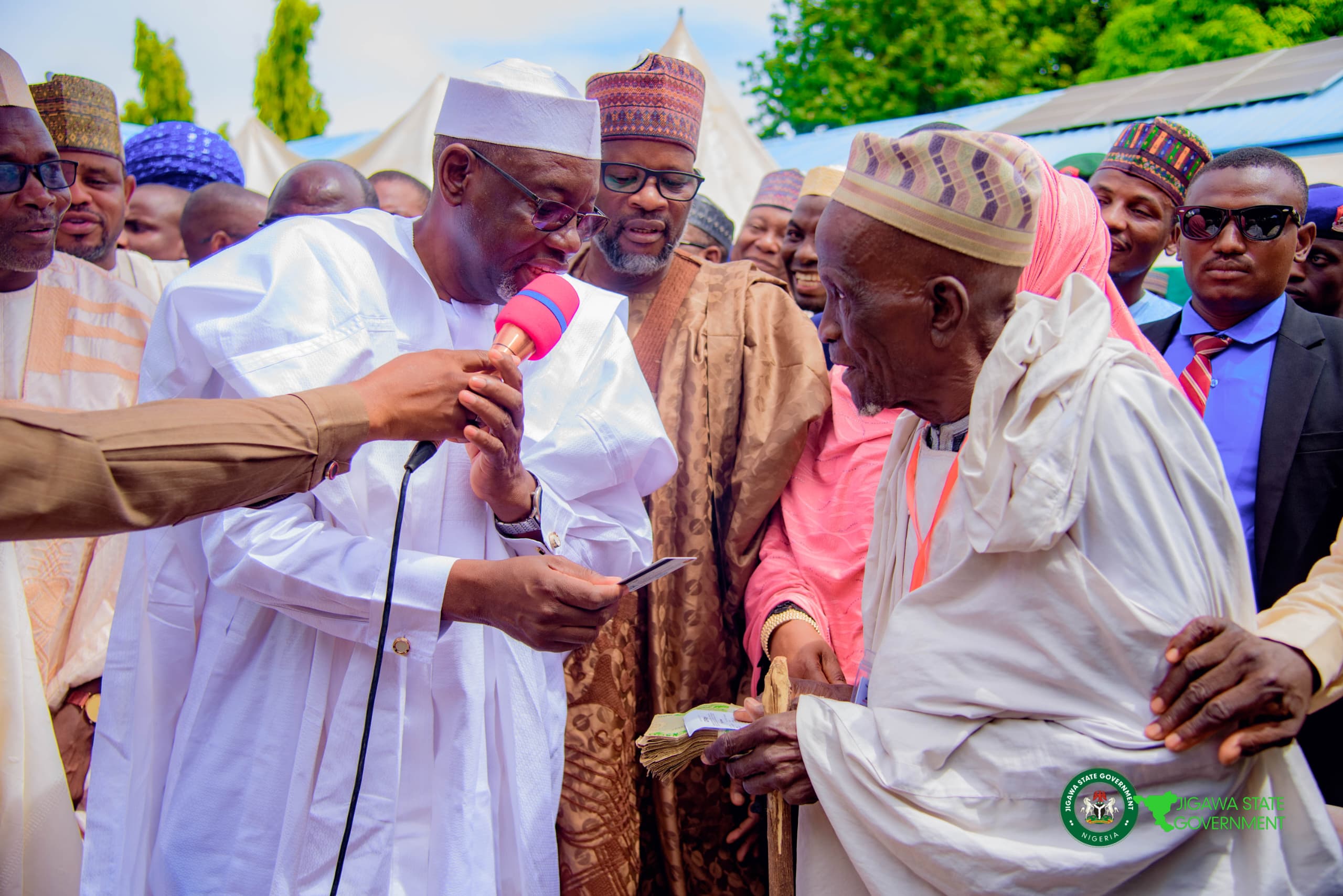By Mohammed Abubakar Dutse
The Jigawa state governor, Umar Namadi on Tuesday expanded the implementation of a life-cycle social protection framework through the launch of a comprehensive system that provides continuous welfare support for the aged.
The governor flagged off the state wide programme dubbed Jigawa State Old Aged Social Protection Scheme at Dutse local government Secretariat governor handed out the Cash-Out to some selected beneficiaries from three local government areas of Dutse, Birinin Kudu and Kiyawa under the first phase.
Altogether a total of 5 740 Aged are scheduled to benefit from programme, comprising 20 beneficiaries each from the 287 political wards across the 27 LGAs in the state.
He described the initiative as a pioneering achievement in his administration’s commitment to building an inclusive and compassionate society in Jigawa State.
According to him, “This programme represents the completion of our life-cycle approach to social protection interventions in Jigawa State, considering other already ongoing social protection interventions targeting pregnant and lactating mothers and children under the age of 5 years,” Governor Namadi stated.
He explained that the life-cycle framework ensures that no segment of society is left behind, with programmes that promote dignity, equity, and access to essential services for all, particularly the vulnerable and disadvantaged members of society.
“Throughout the entire life cycle, we now have programmes that provide continuous support from pregnancy, childhood, adolescence, youth, and now, old age. Moreover, these are being implemented in an inclusive manner, which is in addition to the flagship program of monthly social security for the disabled. This perfectly aligns with the provisions of the Jigawa State Social Protection Policy and Law, both of which emphasize equity, dignity, and access to essential services by vulnerable segments of the population.”
The newly launched Old Age Support Scheme offers a monthly cash transfer, free healthcare services, and long-term social care for elderly citizens across the state, as each of the 287 political wards will have 20 beneficiaries, making a total of 5,740 elderly persons targeted in the first phase.
Under the arrangement, the Jigawa State Rehabilitation Board will manage the cash transfer component, while free healthcare services will be provided through the Jigawa State Contributory Health Insurance Management Agency (JICHMA).
The Ministry of Women Affairs and Social Development will coordinate long-term care, including home visits, counselling, and psychosocial support to promote healthy and active ageing.
Governor Namadi emphasized that the intervention builds on existing welfare programmes, including the Maternal Cash Transfer Scheme, which was recently expanded to provide ₦7,000 monthly to 30 beneficiaries per ward, up from ₦5,000 for 20 beneficiaries.
He also announced the relaunch of the Monthly Social Security Scheme for Persons with Disabilities, following a recent amendment to its enabling law that increases the number of beneficiaries per local government from 150 to 200 and raises the monthly payment from ₦7,000 to ₦10,000; enrollment of new beneficiaries has already commenced to meet the new target of 5,200 people across the state.
“All these interventions are directly aligned with our 12-Point Agenda, particularly the pillar on Social Welfare and Inclusive Development, which focuses on improving the lives of vulnerable groups, including Persons with Disabilities.”
He further revealed that the government has completed data collection on orphans and orphanages in preparation for a new Orphans Welfare Programme which aims at supporting children in vulnerable conditions.
The governor called on community leaders and families to show greater care and respect for the elderly, describing them as “the pillars upon which our society was built.”
“Together, we will continue to make Jigawa a model for inclusive, people-centered governance in Nigeria,” he stated.
Emir of Dutse, Hamim Nuhu Sanusi commended the governor’s leadership qualities of catering for the less privileged, noting that n no distant time, Jigawa state would shed the toga poverty capital of f the country.
He added that the state had not had it so smooth in terms of people’s- oriented administration such as Namadi’s, maintaining that the administration had touched virtually alk spheres of the state life.

 Business News1 week ago
Business News1 week ago
 News1 week ago
News1 week ago
 News1 week ago
News1 week ago

























